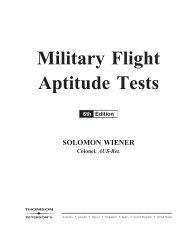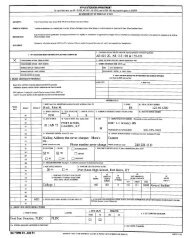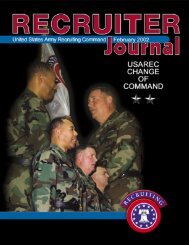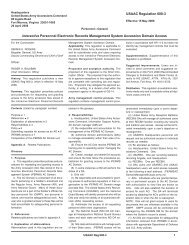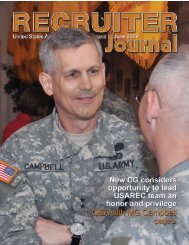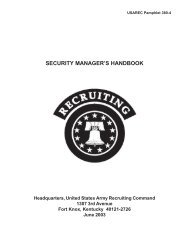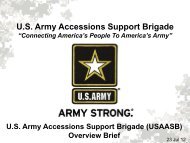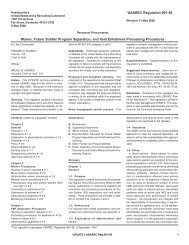19 Dec Cover.pmd - USAREC - U.S. Army
19 Dec Cover.pmd - USAREC - U.S. Army
19 Dec Cover.pmd - USAREC - U.S. Army
You also want an ePaper? Increase the reach of your titles
YUMPU automatically turns print PDFs into web optimized ePapers that Google loves.
1. Purpose<br />
This pamphlet provides information on how to conduct thorough and impartial investigations. It should be used<br />
with the prescribing directive under which the investigating officer (IO) was appointed. This guide is designed to<br />
explain the basic techniques and procedures of the investigation. If this pamphlet conflicts with the prescribing<br />
directive, the prescribing directive will govern. If this pamphlet conflicts with AR 15-6 or any other <strong>Army</strong> regulation,<br />
the <strong>Army</strong> regulation will govern.<br />
2. References<br />
For related publications and blank forms see appendix A.<br />
3. Explanation of abbreviations<br />
a. FSTP — Future Soldier Training Program<br />
b. IO — investigating officer<br />
c. MEPS — Military Entrance Processing Station<br />
d. RI — recruiting impropriety<br />
e. ROI — report of investigation<br />
f. <strong>USAREC</strong> — United States <strong>Army</strong> Recruiting Command<br />
g. BJA — Brigade Judge Advocate<br />
4. Mission<br />
The mission of the IO is to conduct a thorough, impartial investigation, determine the facts of the case, and provide<br />
the appointing authority with findings and recommendations that properly apply governing standards, regulations, and<br />
laws. An IO’s duty takes precedence over all other duties.<br />
5. Preparation for duty as an IO<br />
Your investigating duties will be an additional duty, but will take priority over your normal duties. Most of the<br />
preparation for gathering evidence can take place at your normal duty station. Proper advanced planning will allow<br />
you to do a thorough investigation and meet the required suspense dates without being away from your normal<br />
duties or duty station for an extended period of time. Before you begin to collect evidence you must:<br />
a. Read the memorandum of appointment and any supporting documentation to ensure you fully understand what<br />
the appointing authority wants you to investigate. However, be aware of other potential areas of investigation that<br />
may arise in the course of your investigation. Should your investigation uncover new misconduct, you must notify<br />
your legal advisor and coordinate with the appointing authority before expanding the scope of your investigation.<br />
Informal investigations will be appointed in writing (see figure 1).<br />
b. Study AR 15-6, the prescribing directive, and this pamphlet. These publications provide guidance on procedures<br />
and what is expected in your report of investigation (ROI).<br />
c. Understand the regulations, policies, and directives that govern the subject area of your investigation. You<br />
must consult your Brigade Judge Advocate (BJA) or legal advisor prior to investigating and they will assist in<br />
obtaining these references and will aid in clarification or interpretation of any matters, including possible search<br />
and seizure questions and authorizations.<br />
d. Your BJA or legal advisor will assist in defining the allegation(s) and assist in determining what evidence may<br />
be relevant. This is the who, what, where, when, why, and how of the investigation.<br />
e. You must decide what is the best source for the needed evidence. There are three general categories of<br />
evidence: physical evidence, documentary evidence, and testimonial evidence. Assistance in obtaining the best<br />
evidence should come from your BJA or legal advisor.<br />
6. Preinterview checklist<br />
Before gathering evidence, ask these questions of yourself:<br />
a. Have you read the letter of appointment?<br />
b. Are the allegations clearly stated and understandable?<br />
c. Have you gathered the required regulations, policy letters, messages, and directives?<br />
d. Do you understand the elements of proof for the stated allegations (for example, see <strong>USAREC</strong> Reg 601-45,<br />
<strong>USAREC</strong> Reg 600-25, and Manual for Courts-Martial, United States)?<br />
e. Have you consulted with your BJA or legal advisor?<br />
<strong>USAREC</strong> Pam 27-65 • 20 <strong>Dec</strong>ember 2012<br />
1



